| |
Cryptocoryne ciliata (Roxburgh) Schott var. ciliata |
Cryptocoryne ciliata is a species that grows from India to Papua
New Guinea in the fresh to brackish water tidal zone. There is little known about the variation through that range. Two varieties are distinguished, var. ciliata with a chromosome number of 2n = 22, more narrow leaves and long overground runners and var. latifolia with broad leaves and with typical short
shoots in the axils, having a chromosome number 2n = 33. The latter is sterile. The narrow / broad leaf character may be not firm. The distribution of the var.'s is not well known, at several places also mixed populations are found. The highly developed embryos in var. ciliata are also known from Cryptocoryne versteegii.
Click on the picture to get the full image (ca. 50 kB) |
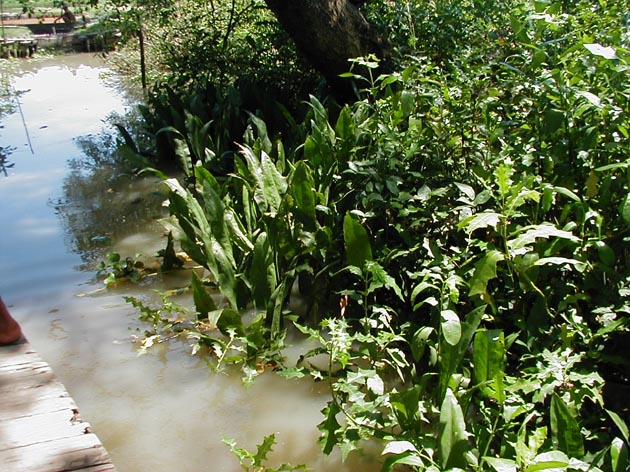 |
C. ciliata var. ciliata growing in a ditch near Surabaya, Java (Indonesia).
coll. SW-P09
photo Wongso |
|
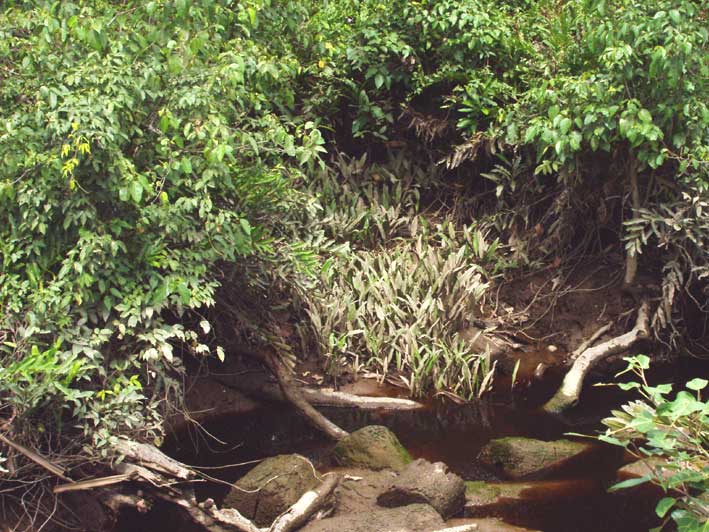 |
A locality near Timika, Papua (Indonesia)
coll. SW 0501
photo Wongso
|
|
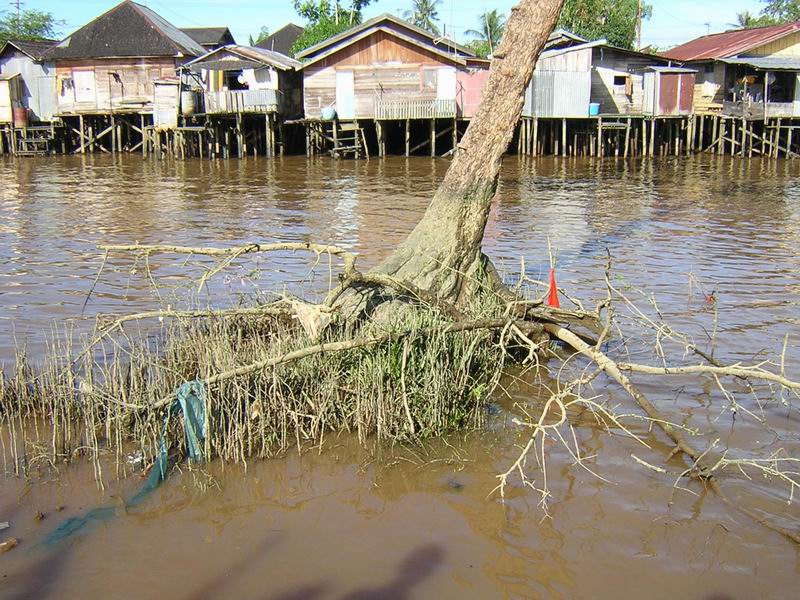 |
C. ciliata var. ciliata growing between the roots of the tree in the river delta at Banjarmasin, Kalimantan.
photo Budianto |
|
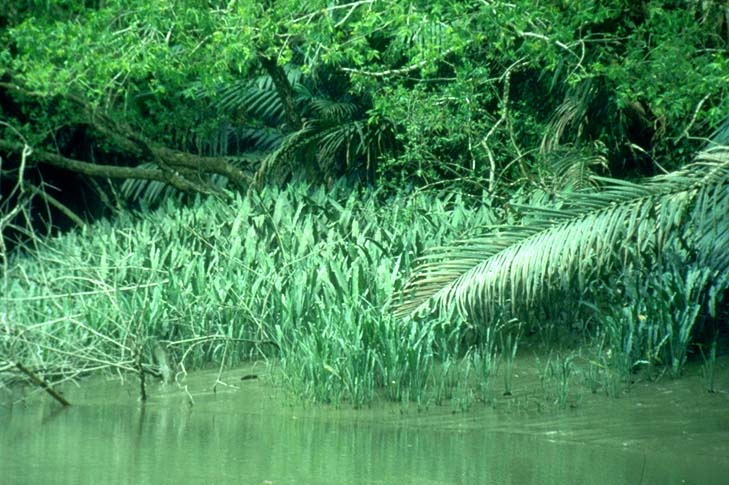 |
A habitat near Kikory in Papua New Guinea.
photo Hansen
|
|
| |
|
|
|
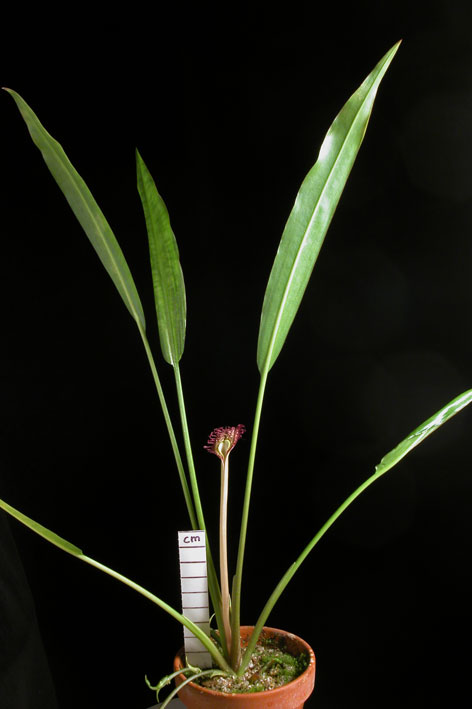 |
Young plants may have much narrower leaves than adult ones.
coll. SW 09-27, cult. B 1327
|
|
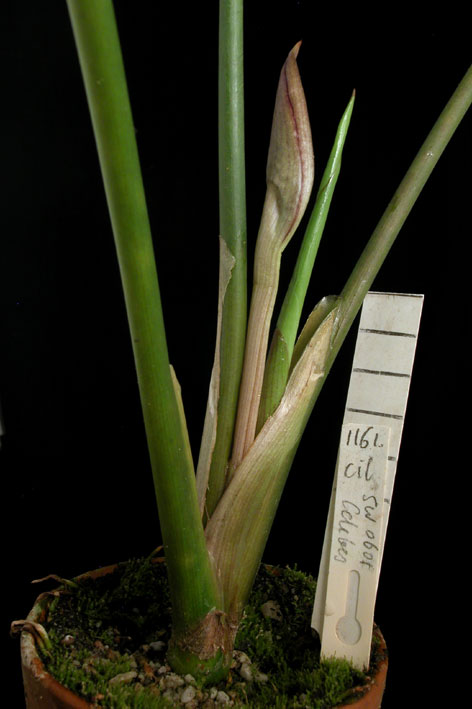 |
Elder plants often develop short living, paper like bracts.
coll. SW0601, cult. B 1161
|
|
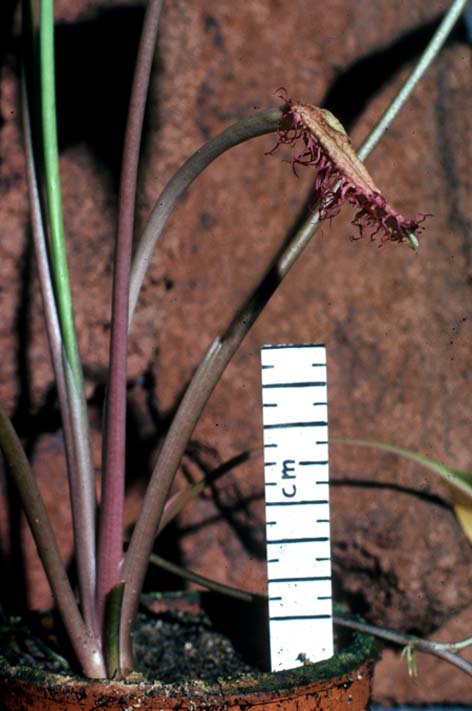 |
Often the tube bend forwards. Note also the long overground runners.
coll. unknown, cult. B 63>
|
|
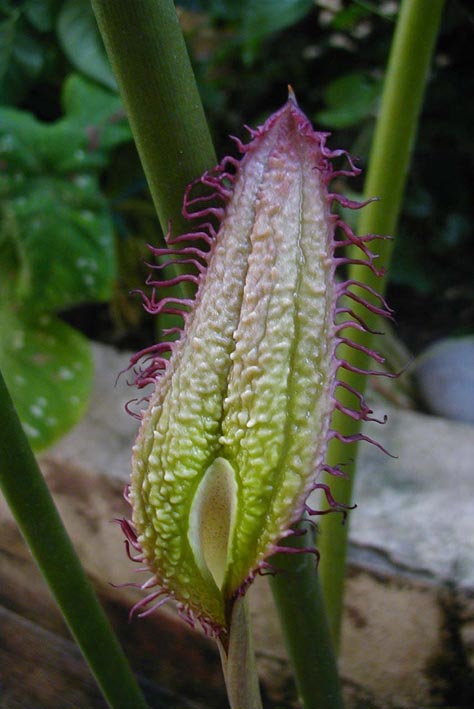 |
Note the narrow collar.
coll. & cult. SW-P27
photo Wongso
|
|
| |
|
|
|
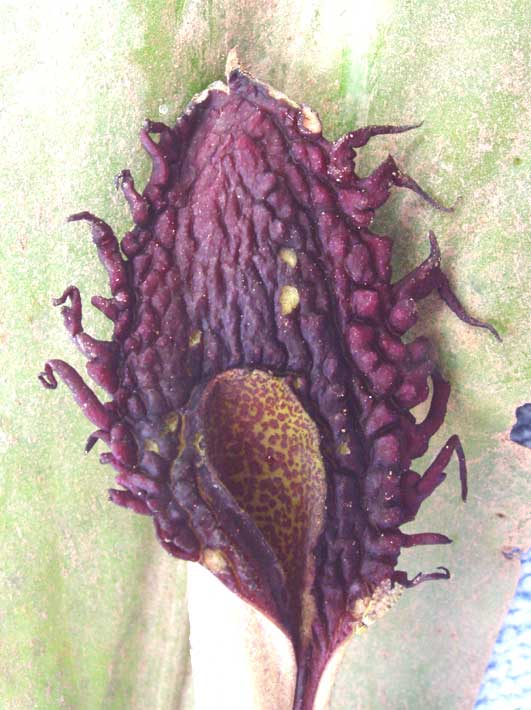 |
The limb of the spathe from the Timika plant with a narrow collar
coll. SW 0501
photo Wongso
|
|
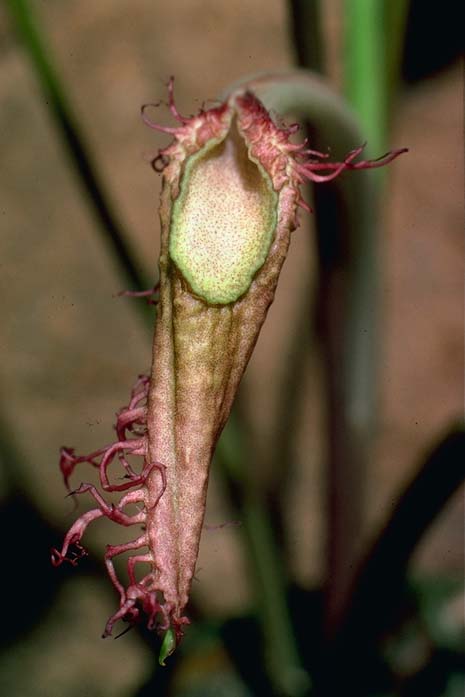 |
C. ciliata var. ciliata with a very broad collar. At ripening the limb folds backwarts
coll. unknown, cult. B 63
|
|
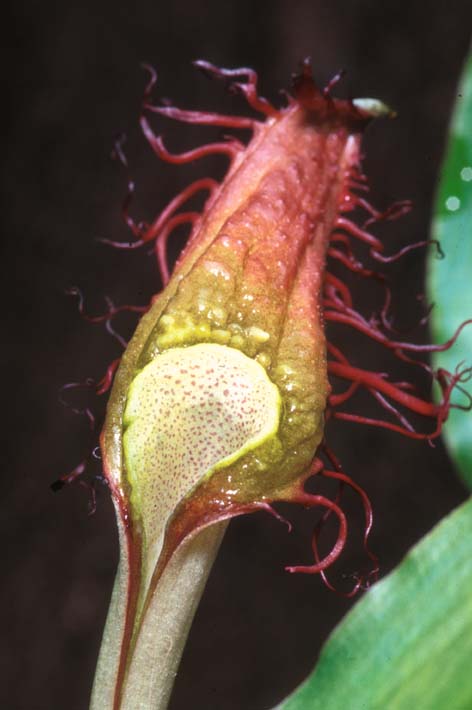 |
This specimen has long cilia ...
coll. unknown, cult. B 606
|
|
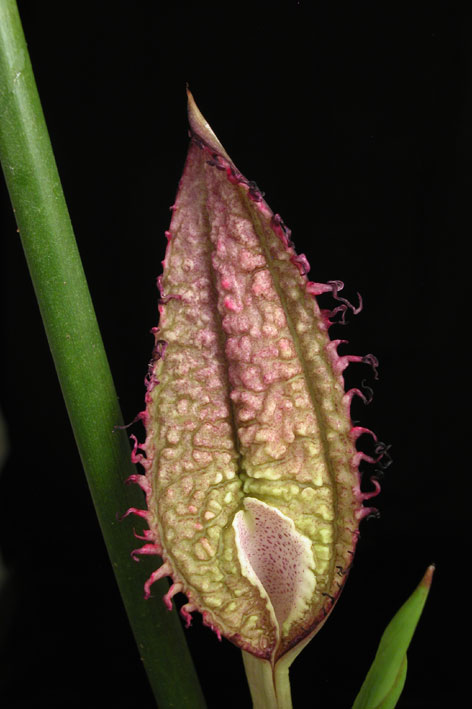 |
... this one short cilia and also a norrow collar.
coll. SW 0601, cult. B 1161
|
|
| |
|
|
|
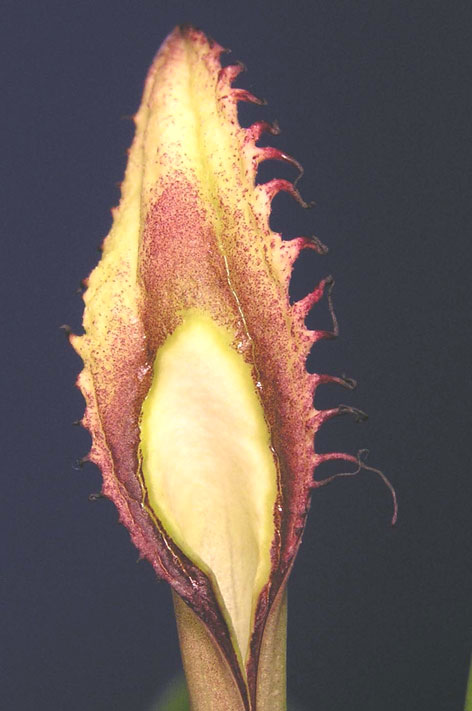 |
This plant comes from Bangla Desh. The range in variation is still not well known.
coll. & photo Bem
|
|
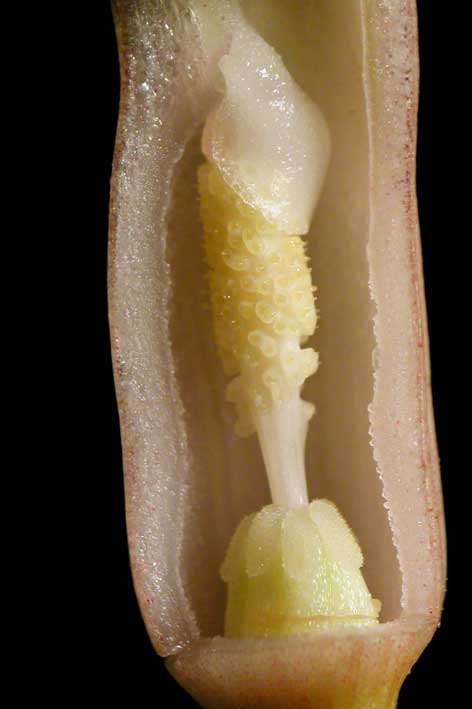 |
Opened kettle of C. ciliata var.ciliata.
coll. SW 09-27, cult. B 1327
|
|
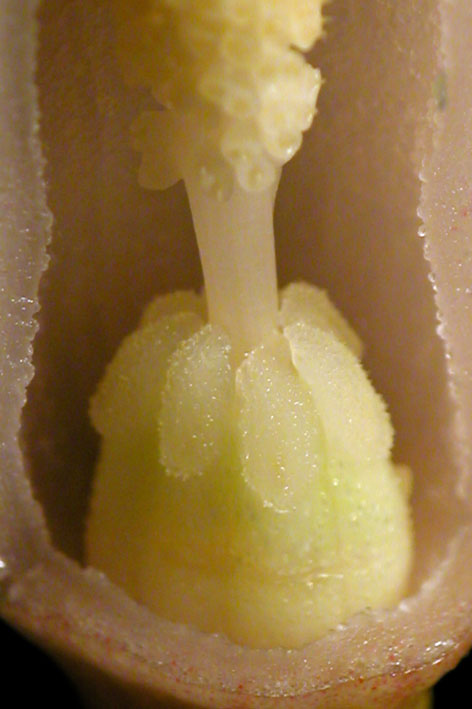 |
The narrow ovate, inward bend stigma's are nearly sessile.This is rare in Cryptocoryne.
coll. SW 09-27, cult. B 1327
|
|
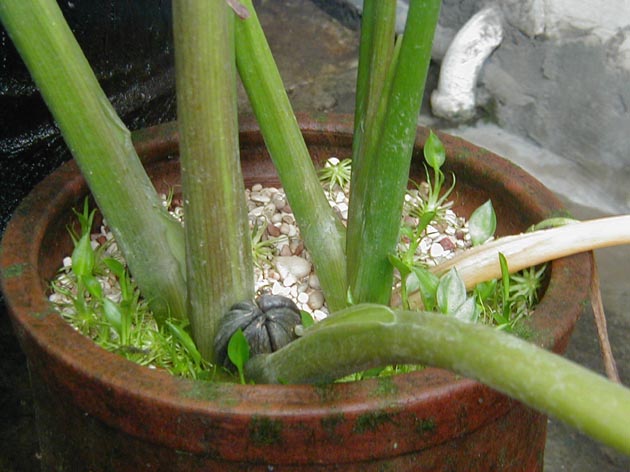 |
Cultivated plant with fruit
and the typical seedlings (see below).
coll. & cult. SW-P23
photo Wongso
|
|
| |
|
|
|
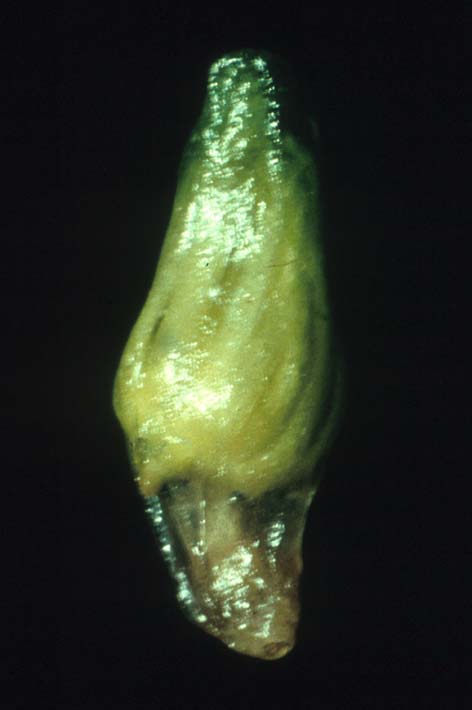 |
In the 1961 van Liet, Amsterdam, imported
fruiting specimen of C. ciliata var. cilata. This seed show the typical sack with the
'plumila' inside.
photo van Bruggen
|
|
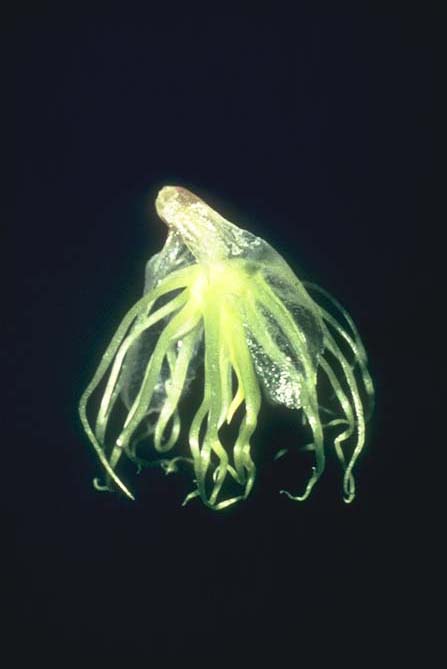 |
When the sack opens, the 'plumila' spread. When
the seed is released it will drift away with the tidal current, the 'plumila'
probably for anchoring.
photo van Bruggen
|
|
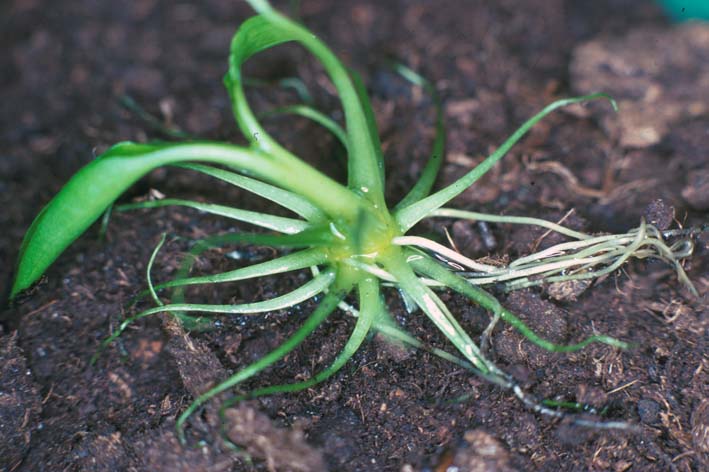 |
A young cultivated specimen of C. ciliata var.ciliata.
Note the first leaves (top left) and the developing roots (white) among the 'plumila'.
photo Möhlmann<
|
|
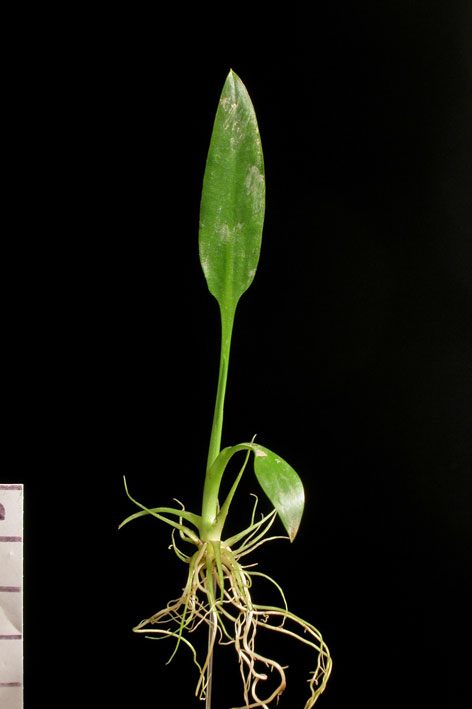 |
A developing plant. The 'plumila' are still present.
coll. NJM11-55, cult. B 1484
|
|
| |
|
|
|
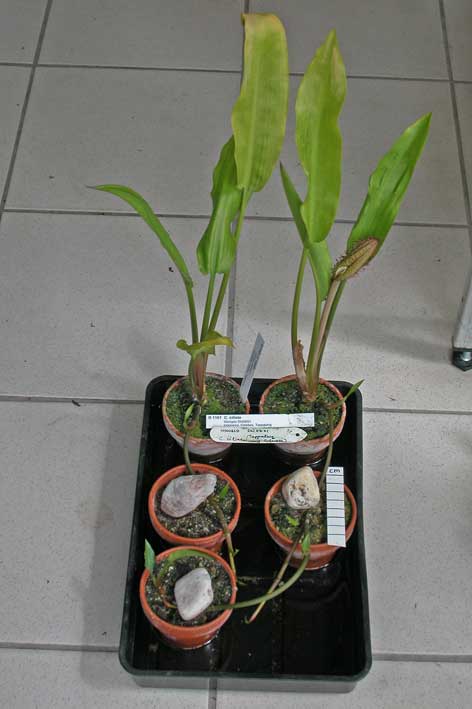 |
The long, overground runners of C. ciliata var. ciliata remain firmly attached to the mother plant for months.
coll. SW 0601, cult. B 1161 |
|
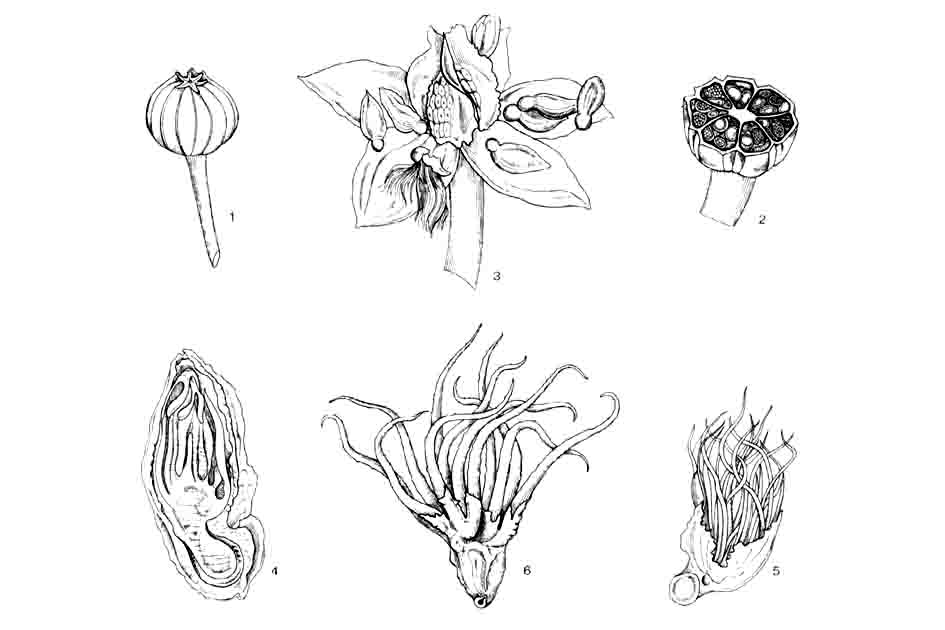 |
In de Wit (1990) you find an (reworked)
copy of the drawing found in Solly (1846) on notes of William Griffith. Follow the numbers
for the development in time.
drawing Ike Zewald
|
|
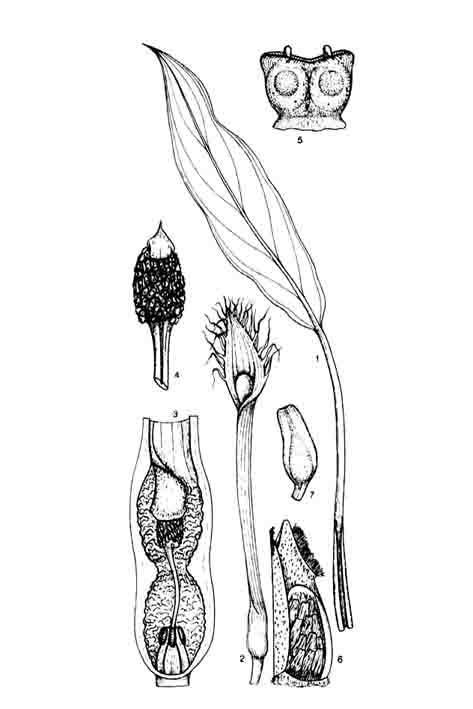 |
Drawing of C. ciliata in De Wit (1990).
It is uncertain whether this is var. ciliata or var. latifolia. Drawned after by Blass cultivated material.
drawing Ike Zewald |
|
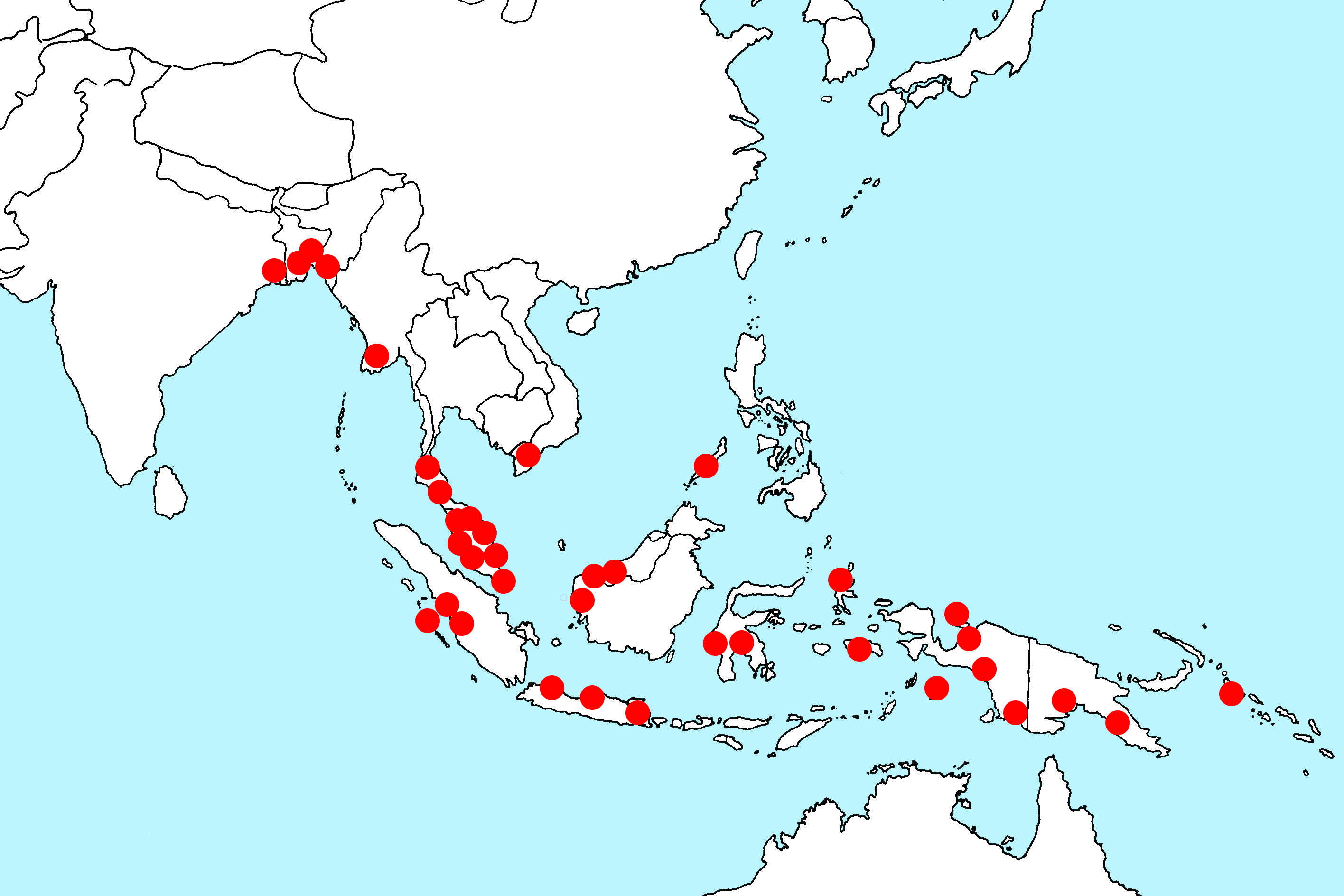 |
Distribution of C. ciliata for both var. ciliata and var. latifolia.
No C. ciliata made the crossing to Australia, only recently it is known from the Philippines.
|
|
| |
|
|
|
Cryptocoryne ciliata is easy to cultivate in emerged culture in a simple mixture of sand and peat litter with artifical fertilisation.. Both var.'s propagate rather quick. They can be grown in relative dry air, in full sun, but they are sensitive for cold: in an open pot behind a cold window will not go for long.
Their dry-air tolerance makes them well suited for time-lapse photography. See the movie of the opening of the limb of the spathe
See also the page for C. cilata var. latifolia
Updated July 2012 |
Literature.
- Arends, J.C., Bastmeijer, J.D. & Jacobsen, N. 1982.
Chromosome numbers and taxonomy in Cryptocoryne (Araceae).II. Nord.J.Bot. 2 : 453-463.
- Bruggen, H.W.E.van. 1959. Cryptocoryne ciliata. Het Aquarium 29(7) : 159-161.
- Bruggen, H.W.E.van, 1962. Cryptocoryne ciliata (Roxb.) Fischer ex Wydler. DATZ 15 :
275-277.
- Engler, A. 1920. (Cryptocoryne, Lagenandra in) Das Pflanzenreich IV.23.F. Araceae -
Aroideae : 232-249, Leipzig.
- Hansen, B. 1995. Kikory kaleidoscope. Fishes of Sahul 9 - 3 :417-243.
- Hoogendoorn, W. 1965. Generatieve en vegetatieve vermenigvuldiging van Cryptocoryne
ciliata. Het Aquarium 5/11 : 253-255.
- Jacobsen, N., 1980. Does Cryptocoryne ferruginea flower at full moon?. Aroideana Vol 3/4 :
111-116.
- Jacobsen, N. Cryptocorynen, Alfred Kernen Verlag, Stuttgart.
- Kasselmann, C. 1995. Aquarienpflanzen. Ulmer, Stuttgart.
- Leach, J & P.L.Osborne. 1985. Freshwater plants of Papua New Guinea. The Universtity
of Papua New Guinea Press.
- Rataj, K. 1975. Revision of the genus Cryptocoryne Fischer. Studie CSAV, c.3.Praha.
- Rataj, K. & Horeman, T.J. 1977. Aquarium Plants. TFH Publ, USA.
- Vlasblom, J. 1957. Vegetatieve vermeerdering van Cryptocoryne ciliata. Het Aquarium 28(3)
: 60-62.
- Wit, H.C.D.de. 1958. A large and versatile Cryptocoryne. Fishkeeping and water life, july
58 : 434-435.
- Wit, H.C.D.de. 1990. Aquarienpflanzen, 2. Auflage. Ulmer, Stuttgart.
When you like to read some older discussions on this
amazing Cryptocoryne and see some extraordinary nice drawings:
- Goebel, K. 1894. Cryptocoryne, eine "lebendig
gebärende" Aroidee. Flora 83 : 426-435.
- Griffith, W. 1851. Cryptocoryne. Not.Pl.Asiat.III:134-143; Icon.Pl.Asiat.3 T.170,172.
Calcutta.
- Griffith, W. 1851. On the Ambrosina ciliata of Roxburgh. Trans.Linn.Soc.London 20 :
263-276, Tab. 10-12.
- Hooker, J.D. 1893. Cryptocoryne, Lagenandra in: Flora of British India 6 : 492-496.
- Roxburgh, W. 1819. Ambrosina ciliata. Plants of the Coast of Coromandel III : 90-91, Pl.
- Schott, H.W. & Endlicher, S. 1832. Cryptocoryne. Melemata.Bot. I : 16.
- Solly, R.H. 1846. Comments on "On the Ambrosinia ciliata of Roxburgh by W. Griffith.
Lin.Soc.I : 263-267.
- Wight, R. & G.Walker – Arnott. 1844. Cryptocoryne. Icon.Plant.Ind.Orient. III :
t.772-775.
|
|
|
|
 |
|
|